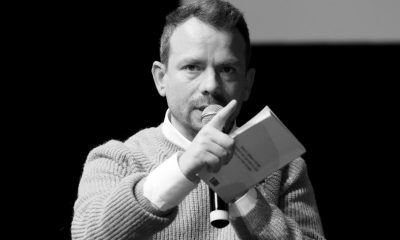Namai
ES turi vadovautis britų vadovais ir spręsti #SexualViolence


On June 11, Nobel laureate Nadia Murad joined a group of senior British politicians to demand justice for the thousands of Vietnamese women raped by South Korean troops during their country’s war for independence. The event, held near the Houses of Parliament, was attended by several survivors as well as their children, who are known as ‘Lai Dai Han’, or ‘mixed blood’ – a pejorative description which has been used to humiliate them in the four decades since the conflict.
The event is just the latest in a series of gatherings in London to demand justice for the Lai Dai Han and their mothers. The willingness of British lawmakers to support the cause, and help a group of people who have been failed by their own government, should be welcomed. However, if British, and indeed European, politicians wish to help survivors of sexual violence, they need to urgently address the shocking levels of abuse still being witnessed across the continent.
Europe likes to portray itself as a global leader in the protection of women. The EU says it’s committed to “transforming the lives of women and girls” through its external relations, and has invested millions of euro to tackle sexual violence in countries such as the Democratic Republic of Congo. Yet, in the EU itself, one in 20 women has been raped since the age of 15 and one in 10 has experienced sexual violence.
Despite these alarming statistics, most countries have still to put proper legal protections in place to tackle the problem. Only nine European states have adopted a modern definition for the treatment of rape, based on lack of consent rather than physical violence. Even Europe’s most outwardly progressive countries are abetting sexual attackers by failing to provide proper protection to their victims.
Remarkably, new research shows the prevalence of rape and sexual violence is twice as high in Switzerland as it is across the EU as a whole, even though the country is among the wealthiest (and supposedly safest) in Europe. The tyrimas, based on interviews with nearly 4,500 women and girls, also shows alarmingly low levels of reporting. In fact, only 8% of victims say they reported their ordeal to the police.
Amnesty says the figures are “staggering” and hopes they provide a “wake-up call” for the Swiss government. Yet, sadly, it’s far more likely the Bern authorities continue their blissful slumber. After all, the annual number of rapes has been climbing for years and no-one seems to be doing anything about it.
Like many European countries, the Swiss legal system continues to lag behind, sticking to an outdated definition of rape, based on coercion, which effectively suggests that a person who doesn’t try to fight off their attacker has given their permission.
These archaic legal definitions are simply part of a wider problem with lyčių nelygybė, manifest in persistent atlyginimų skirtumus, sexist media coverage ir widespread domestic violence. Switzerland may present as a modern, tolerant nation, but its attitude to women still has far to go.
Facade of equality
But even in countries with a more enlightened approach, women continue to suffer sexual assaults with worryingly frequency. Denmark has been named Europe’s second-best country for gender equality, yet the European Agency for Fundamental Rights has shown the country also has one of the highest rates of sexual harassment in the EU. Now the Scandinavian country remains mired in what Amnesty calls “a pervasive rape culture [with] endemic impunity for rapists”.
Studies suggest the authorities are grossly under-reporting the number of women who suffer sexual attacks. The Ministry of Justice has radau tai 5,100 Danish women are subjected to rape or attempted rape every year, but researchers at the University of Southern Denmark suggest the figure may have been as high as 24,000 in 2017. Even more alarmingly, only 890 rapes buvo pranešta and only 94 in convictions.
Denmark’s justice minister has at least come out in support of a modern, consent-based definition of rape, which is a start. Yet legal reforms are nothing if not accompanied by societal change. Denmark has been named the least feminist country in the world, and this feeds a culture of slut-shaming which deters many rape victims from coming forward. The vast majority of attackers are known to the victim, which blurs the lines further and creates additional barriers for those wishing to speak out.
Teisingumas visiems
Europe’s reluctance to address the scourge of sexual abuse is also evident in its refusal to recognize the scores of Kosovar women who, like the victims of the Vietnam War, were raped in conflict decades ago and have been living with the stigma ever since.
Just like the mothers of the Lai Dai Han, the victims of Serbian atrocities in the late 1990s have been shunned by their own government; not until last year were they even granted a proper pension. Even now, many women are afraid to come forward to claim reparations, fearful of reprisals from their deeply conservative community, which still views rape as a stain on the entire family. As recently as 2017, not a single survivor of Serbian rape had spoken publicly about their ordeal.
The EU should have been helping these women. Yet, according to Amnesty, “rape and other wartime sexual violence was not a priority” for the bloc’s security mission in Kosovo. Brussels is now putting some belated pressure on Pristina to recognize its war rape victims ahead of its accession to EU membership, but European leaders such as Angela Merkel and Emmanuel Macron have remained conspicuous by their silence.
So, while last week’s event in London is a welcome step forward, there is still far to go. Europe’s figureheads must take their cue from the UK’s lawmakers and start tackling sexual violence, past as well as present. Otherwise, the tortuous ordeal endured by the Lai Dai Han and their mothers will continue to be repeated.
Pasidalinkite šiuo straipsniu:
-

 NATOprieš 5 dienas
NATOprieš 5 dienasEuropos parlamentarai rašo prezidentui Bidenui
-

 Kazachstanasprieš 5 dienas
Kazachstanasprieš 5 dienasLordo Camerono vizitas parodo Centrinės Azijos svarbą
-

 Tabakasprieš 5 dienas
Tabakasprieš 5 dienasTobaccogate tęsiasi: intriguojantis Dentsu Tracking atvejis
-

 Tabakasprieš 3 dienas
Tabakasprieš 3 dienasPerėjimas nuo cigarečių: kaip laimima mūšis be dūmų






















